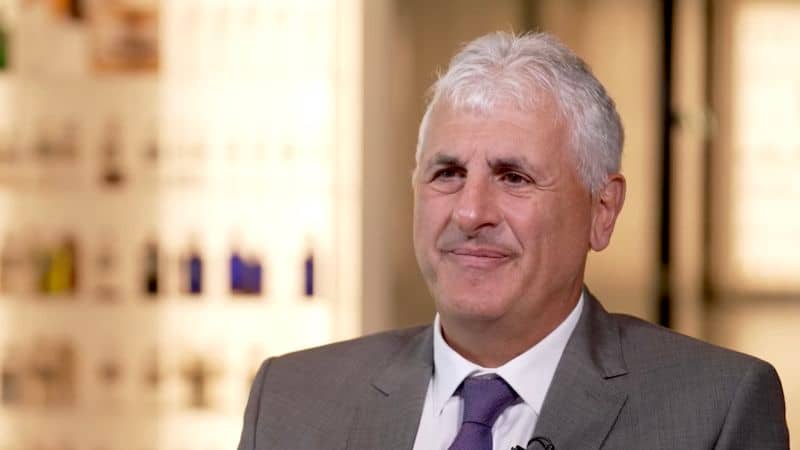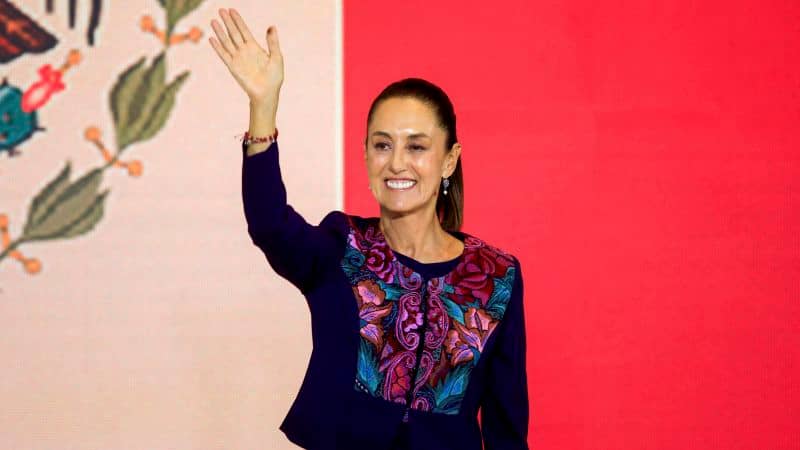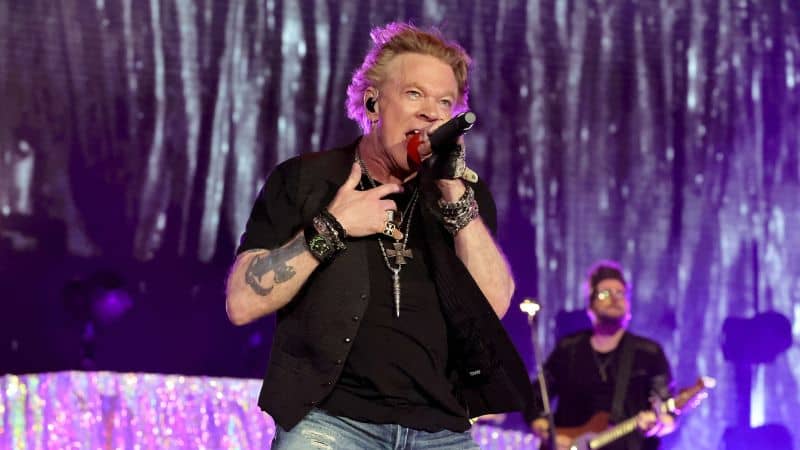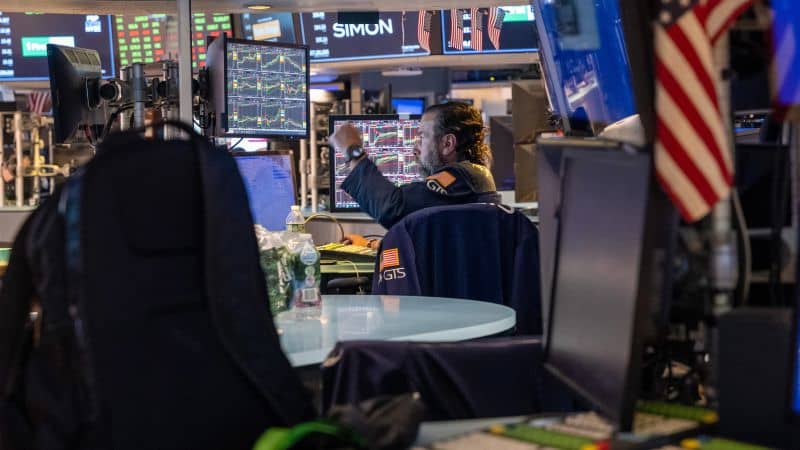New York CNN — Global politics will be dominated by the availability, trade and investment in microchips for the next several decades, Intel CEO Pat Gelsinger told CNN Tuesday. The location of

London
CNN
—
When Africa needs medicines, all too often the continent must look abroad.
African nations consume about 25% of vaccines produced globally, but import nearly 99% of their supply, according to the African Union Development Agency. For packaged medicines, only 36% of demand is produced locally, and just 3% is supplied by regional trade, according to the World Economic Forum.
Of the roughly 600 manufacturers of packaged medicines operating on the continent, South Africa’s Aspen Pharmacare is one of the largest, with more than 9,000 employees in over 50 countries. CEO Stephen Saad discussed the future of the pharmaceutical sector in Africa, and what lessons Aspen Pharmacare has learned from the Covid-19 pandemic, with CNN’s Eleni Giokos.
The following interview has been edited for length and clarity.
During the pandemic, we’ve seen a spotlight on the inequalities that exist on the continent in the pharmaceutical sector. Aspen has had a very strong commercial presence across Africa and now you’re moving up the value chain. Certainly Covid has catalyzed a lot of work that you’re doing. Tell me what you’re up to.
Saad: You mentioned inequalities. [Covid] really sparked the world’s attention to say, ‘Hey, this doesn’t seem right.’ We were very proud to be able to deliver vaccines to the continent in the quantities that we did, but the reality of Covid was that Africa didn’t get vaccinated. But what we’ve learned — whether it was Aids or multi-drug-resistant TB — is that we have to be strong regionally. We have really doubled down and instead of saying, ‘Look we’ve lost the Covid vaccine volumes and so we’re closing up,’ we’ve actually put [in] even more capacity. We’re committed to one person one vaccine in Africa and we’re working very hard towards that process.
If I had to ask you to describe what the pharmaceutical sector looks like right now in Africa, what would your answer be?
The answer is simple. When Covid came and Africa needed vaccines, over 90% of the vaccines were supplied by India — and that wasn’t great. At the end of the day, you can’t ask politicians from other countries to supply someone else before them. I don’t think anybody wants Africans to suffer, but the reality is when the borders close, whether it was Europe or India, they looked after their own population first. If it hadn’t been for Aspen, there would have been no vaccines made in Africa for the continent.
There’s a lot of money going into it now, there’s a lot of investment, there are many initiatives — many of them government-driven. We, off our own bat, have decided that we want to be a source not just of vaccines but biologicals — we would really like to be assisting in oncology, diabetes. We’ve got a lot that we would like to do across the continent to make sure we get access, because there are so many diseases that are just so under-serviced.
The World Trade Organization has done a lot on the policy front for Africa. The Continental Free Trade Area will hopefully make it a lot easier for cross-border trade in the pharmaceutical space. What challenges do you face?
There are numerous challenges. We have facilities in Accra [Ghana], Dar-es-Salaam [Tanzania], Nairobi [Kenya] … It is not always easy to get registrations approved. You decide not to put medicine in Kenya, for example, because of the cost of registration and the time taken. Whereas if it was already registered, we’d be exporting manufacturing into one of those territories.
It’s not so much a tariff issue or a trade issue, this is really a regulatory issue, where your medicine is required to be registered in a specific country in a specific way. For example, you can register a product across Europe [via] a central regulatory body. I think that is something that Africa should also consider.
Even though you say you’re doing good, you still have to make money. How do you balance out all of these factors?
There is this [misconception] that for you to supply cost-affordably means that it’s not very profitable. So much is about economies of scale. I remember when we did ARVs [antiretrovirals, used to treat HIV] and we were desperately trying to cut the price by nearly 90%. We got some fantastic pricing from everyone, but we still made a loss. The decision we made was, let’s go for it. At worst we would have a pretty expensive social investment project, but we backed ourselves that with increased volumes we would be able to reduce pricing. That’s what happened — the volumes came in, the prices, the technologies, and it became affordable. So sometimes you just have to go in and do it. I can’t tell you it was an exact science, but I do believe there’s a balance to be had.
I do think the world acknowledges that there are people that can pay and there are people that can’t pay. To deny people that can’t pay simply because they don’t have money is not a model that’s sustainable.
Don't Miss
‘Putin is a killer,’ says Ukraine goalkeeper as he sends a message of hope to his country Shaktar Donetsk and
Heavy snow and blizzard conditions will continue to blast portions of the Midwest. Strong winds will also ramp up across
You may have never heard of PFAS, but you likely have these potentially dangerous chemicals inside your body. CNN’s Dr.

‘Putin is a killer,’ says Ukraine goalkeeper as he sends a message of hope to his country
Shaktar Donetsk and Ukraine goalkeeper Anatoliy Trubin talks to CNN Sport about doing his part to help his nation survive the Russian invasion.
Don't Miss
London CNN — When Africa needs medicines, all too often the continent must look abroad. African nations consume about 25%
US national security adviser Jake Sullivan confirmed Sunday that the US will allow European countries to start training Ukrainian fighter
A view of the Kremlin in Moscow, Russia, on September 19, 2021. (Alexander Nemenov/AFP/Getty Images) Senior Russian officials at the

CNN
—
Mexico is a safer country than the United States, Mexican President Andrés Manuel López Obrador argued on Monday, weeks after the high-profile kidnapping of four Americans drew global attention to the country’s security crisis.
“Mexico is safer than the United States. There is no issue with traveling safely through Mexico. That’s something the US citizens also know, just like our fellow Mexicans that live in the US,” he said during his daily morning press briefing.
The kidnapped Americans were traveling in the Mexican border city of Matamoros in early March when they came under attack by gunmen believed to be linked to the Gulf cartel. Two of the Americans and a Mexican bystander died in the incident.
On Friday, the Texas Department of Public Safety advised that residents avoid travel to Mexico during spring break, citing the risk of cartel violence.
Asked by a local reporter about security in Mexico, López Obrador cited his country’s popularity with American tourists and expats, who have descended upon popular coastal areas as well as Mexico City in recent years to take advantage of the warmer weather and cheaper cost of living. US travelers generate billions in revenue for Mexico annually.
“US government alerts say that it’s safe to only travel [in the states of] Campeche and Yucatan. If that were the case, so many Americans wouldn’t be coming in to live in Mexico City and the rest of the country. In the past few years is when more Americans have come to live in Mexico. So, what’s happening? Why the paranoia?”
The Mexican president also claimed there was “a campaign against Mexico from conservative US politicians that don’t want this country to keep developing for the good of the Mexican people.”
While parts of Mexico are established touristic destinations, violent crime including kidnapping and human trafficking plague parts of the country, particularly in border areas. Mexico’s overall homicide rate is among the highest in the world, and the country has been troubled by an epidemic of disappearances with more than 100,000 Mexicans and migrants still missing.
Accusations of inaction and corruption against Mexican officials have also eroded public trust; last year, a Mexican government report blamed the country’s own military and police for the infamous disappearance of 43 students in 2014.
The US State Department has “do not travel” advisories in place for six of Mexico’s 32 states, including northeast Tamaulipas state, where Matamoros is located. It warns Americans to “reconsider travel” to seven Mexican states and “exercise increased caution” in 17 states.
Canada and the United Kingdom also have detailed travel warnings for Mexico.
Six people have been arrested in relation to the deadly Matamoros kidnapping, and Mexico has dispatched hundreds of security forces to the area in what the defense ministry described as a move to safeguard “the well-being of citizens.”
But the incident has also sparked ongoing tension between the Mexican president and US officials.
Last week, Sen. Lindsey Graham, a Republican from South Carolina, where the victims of the Matamoros attack are from, said he was planning to introduce legislation that would designate the cartels as foreign terrorist organizations, and authorize the US military to operate in Mexico to dismantle drug labs, which are typically run by such criminal organizations.
López Obrador described the notion as an “offense to the people of Mexico” and a “lack of respect for our independence.”
“We are not a protectorate of the United States or a colony of the United States. Mexico is a free, independent, sovereign country. We don’t take orders from anyone,” López Obrador said at a news conference.
Don't Miss
London CNN — When Africa needs medicines, all too often the continent must look abroad. African nations consume about 25%
‘Putin is a killer,’ says Ukraine goalkeeper as he sends a message of hope to his country Shaktar Donetsk and
Presidential candidate Xóchitl Gálvez waves to supporters during an election campaign rally in Tarimbaro, Michoacan state, Mexico, on April 21.

New York
CNN
—
Global politics will be dominated by the availability, trade and investment in microchips for the next several decades, Intel CEO Pat Gelsinger told CNN Tuesday.
The location of “oil reserves [has] defined geopolitics for the last five decades,” Gelsinger said in an interview with CNN’s Julia Chatterley at the World Economic Forum in Davos. “Where the technology supply chains are, and where semiconductors are built, is more important for the next 5 decades.”
Gelsinger said the company’s investment in new manufacturing facilities in the United States, Europe and elsewhere is important not only for the company’s future, but for the “globalization of the most critical resource to the future of the world.”
“We need this geographically balanced, resilient supply chain,” he said.
Intel
(INTC) said last year it would invest $20 billion to build two new US chipmaking facilities, as well as up to $90 billion in new European factories, aimed at reasserting its position as the leader of the semiconductor industry. The announcements also came amid concerns about the concentration of manufacturing for chips, in Asia, particularly China and Taiwan, during the Covid-19 pandemic and as geopolitical tensions grew. Issues in the chip supply chain in recent years have caused shortages and shipping delays of everything from desktop computers and iPhones to cars.
“If we’ve learned one thing from the Covid crisis and this multi-year journey that we’ve been on it’s we need resilience in our supply chains,” Gelsinger said, adding that Intel’s manufacturing investments are aimed at “leveling that playing field so that good investment decisions can be made.”
Gelsinger — who took over as Intel’s chief executive two years ago during a difficult period for the company — acknowledged that the company’s investments in a decades-long strategy are coming during a difficult economic period.
“It’s a touch economic environment in the near term — Covid and China, Ukraine and energy in Europe, inflation in the US — you look across that and ask, ‘Where’s the good news?’” he said. “But at the same time, we need to make long-term investments, three quarter economic environments cannot dictate five- and six-year capital investment cycles … It’s a challenge to be a CEO these days.”
A US law passed last year to boost domestic chipmaking should help. The CHIPS and Science Act will invest more than $200 billion to help companies grow US domestic chip-making and research.
Now, Gelsinger said, Intel and other chipmakers are just waiting for the funds from the law to get dispersed, after President Joe Biden last year directed a steering committee including Commerce Secretary Gina Raimondo to determine how to implement the law and deploy the funds.
“We expect we’ll see those this year,” Gelsinger said of the CHIPS Act funds. “I’m investing, please show up with the money. Because we’re assuming they’ll help us make these massive investments.”
Don't Miss
London CNN — When Africa needs medicines, all too often the continent must look abroad. African nations consume about 25%
CNN — Axl Rose is ending a 30-year Guns N’ Roses tradition. The band’s frontman recently posted a note saying
‘Putin is a killer,’ says Ukraine goalkeeper as he sends a message of hope to his country Shaktar Donetsk and
“Before the end of this year, we will put the country in electoral mode,” Prime Minister Ariel Henry told the country on Monday, though stopping short of setting a date.
Henry, who previously postponed a planned general election amid criticism of the then-electoral council, also felt compelled to defend the delay. “To all those peddling rumors that I intend to keep power, I say that is false,” he added.
Elections are long overdue. The last time Haitians got to choose their own political representatives was in 2016. Parliamentary elections scheduled in 2019 were never organized under the then-presidency of Jovenel Moise, nor were general elections after that.
The Caribbean nation has thus been ruled by decree for three years, first under Moise until his shocking assassination last year, and now under Henry, his appointed successor.
At both men’s sides has been the United Nation’s Integrated Office in Haiti. Known as BINUH, this political mission will mark its third anniversary of operations this October — but faces mounting challenges as the time to hold a vote stretches on.
‘Let’s get through the next elections’
Helen Meagher La Lime, the head of BINUH and Special Representative of the UN Secretary-General for Haiti, told CNN that her focus is to help Henry’s government reach a consensus with opposition and civil society leaders in order to start organizing elections. The process began last year in the wake of Moise’s assassination and has proven painfully slow so far.
“We have a lot of work to do in getting to elections, we need to get this consensus established so that an electoral council can be established. They need to do some work on the Constitution, revisions or a rewrite of the Constitution needs to take place. And then the elections need to get organized,” La Lime said last month, in her first interview since BINUH’s yearlong mandate was renewed by the UN Security Council.
Large swathes of Haiti’s opposition say they do not trust Henry to hold elections, calling instead for a transitional government to take over running the country first. Some also view La Lime and other outsiders with skepticism, in a country where imperialism, occupation and even well-meaning intervention have a long and brutal history.
“Henry must not be allowed to use his support from the international community to continue to concentrate all powers under his exclusive — and failing — leadership,” wrote Jacques Ted St Dic, a member of the Montana group coalition advocating for a transitional government, in an op-ed published last week by Just Security.
“Without legitimacy and without popular confidence in the electoral process, any elections held will be questioned and the new leaders will lack the popular support to institute desperately needed reforms. This is the cycle that has locked Haiti in paralysis for a dozen years,” he also wrote.
La Lime declined to discuss the possibility of a transitional government, telling CNN, “Those are ideas that have to be discussed by Haitians, and a consensus reached by Haitians.”
Instead, she extolled the simple power of shared lunches, provided by BINUH at a local hotel, for bringing political voices together in Haiti. On the basis of such dialogue, she predicted the country could potentially reach elections in 2023 — and even suggested that BINUH itself might no longer be needed after that.
“Let’s get through the next elections to see what levels of stability we have at that point. And then BINUH will consider leaving,” La Lime says. “We are not here forever.”
Making Haiti safe for a vote
The current backdrop of violent unrest in capital city Port-au-Prince makes organizing elections hard to envision, even for those who want change most.
Brutal gang battles in parts of Port-au-Prince this summer saw whole neighborhoods set aflame, displacing thousands of families and trapping others in their homes, afraid to leave even in search of food and water. Hundreds were left dead, injured or missing. Criminals still control or influence parts of the country’s most populous city, and kidnappings for ransom threaten residents’ day-to-day movements.
Part of a larger ecosystem of UN entities and NGOs operating in Haiti, BINUH’s operations are largely limited to consulting with and assisting Haiti’s government and National Police (HNP). Its regular reports are powerful and detailed, documenting in stark language the state of civil society, politics and human rights in the country.
Recognizing the security crisis, BINUH embeds several dozen officers as advisers within the police, and the UN has also announced a new “basket fund” to support the police, which aims to raise 28 million over the next two years. But that money is aimed at long-term goals like funding recruitment and training, increasing the representation of women on the force, and improving police infrastructure and stations, La Lime said.
“The UN can’t fix anything,” La Lime told CNN. “The UN can work with the government of Haiti and the institutions of Haiti to produce an improved result.”
Impatience is growing. In recent weeks, demonstrators in several cities called for Henry’s resignation in the face of high fuel prices, soaring inflation, and unchecked crime. Henry on Monday acknowledged the popular fury, asking for calm — but also announced he would raise gas prices, igniting further protests.
And in August, Luis Almagro, General Secretary of the Organization of American States, blasted global do-gooders, labeling the international community’s efforts in Haiti as “one of the worst and clearest failures implemented and executed within the framework of any international cooperation.”
La Lime readily acknowledges the critics. “Yes, the results are not what they should be,” she told CNN.
Still, her job is not to take responsibility for the past — nor even to shoulder much of it now, she implies.
“I think what we need to do is look at the lessons see what we how we need to work differently. I don’t think we’ve placed enough emphasis on the partnership. In other words, what is it that the Haitian side needs to do to make the effort more sustainable?”
Don't Miss
London CNN — When Africa needs medicines, all too often the continent must look abroad. African nations consume about 25%
‘Putin is a killer,’ says Ukraine goalkeeper as he sends a message of hope to his country Shaktar Donetsk and
A “Help Wanted” sign is seen at a Golden Krust location on June 7 in the Flatbush neighborhood of Brooklyn














